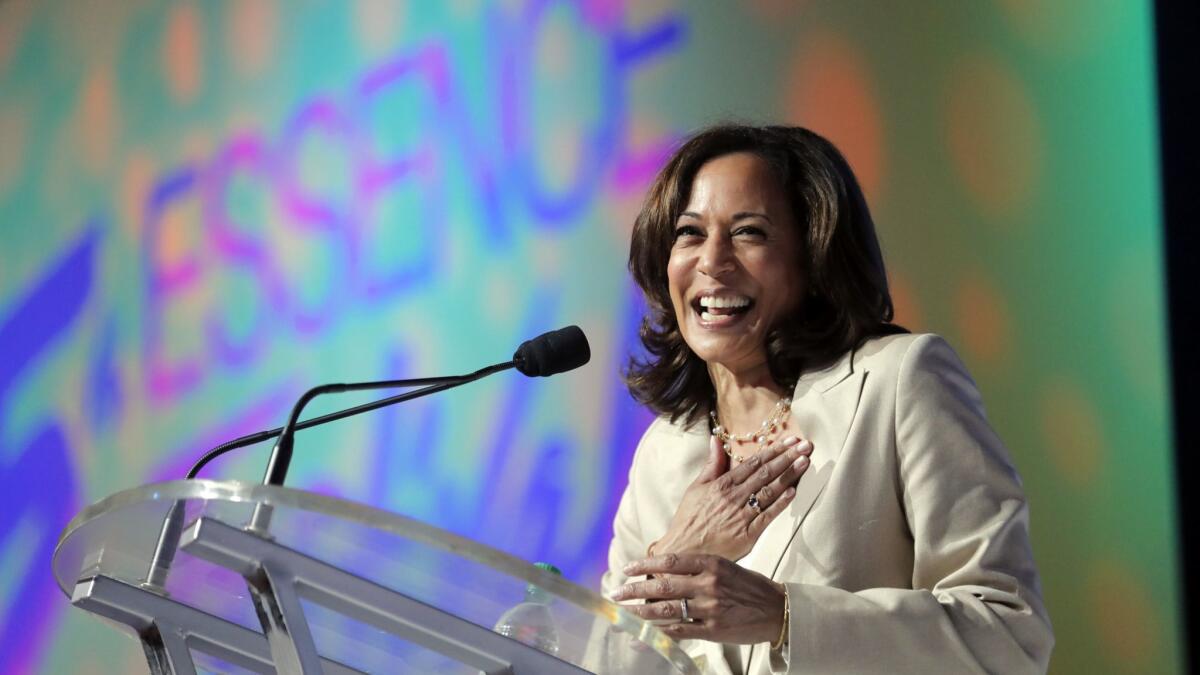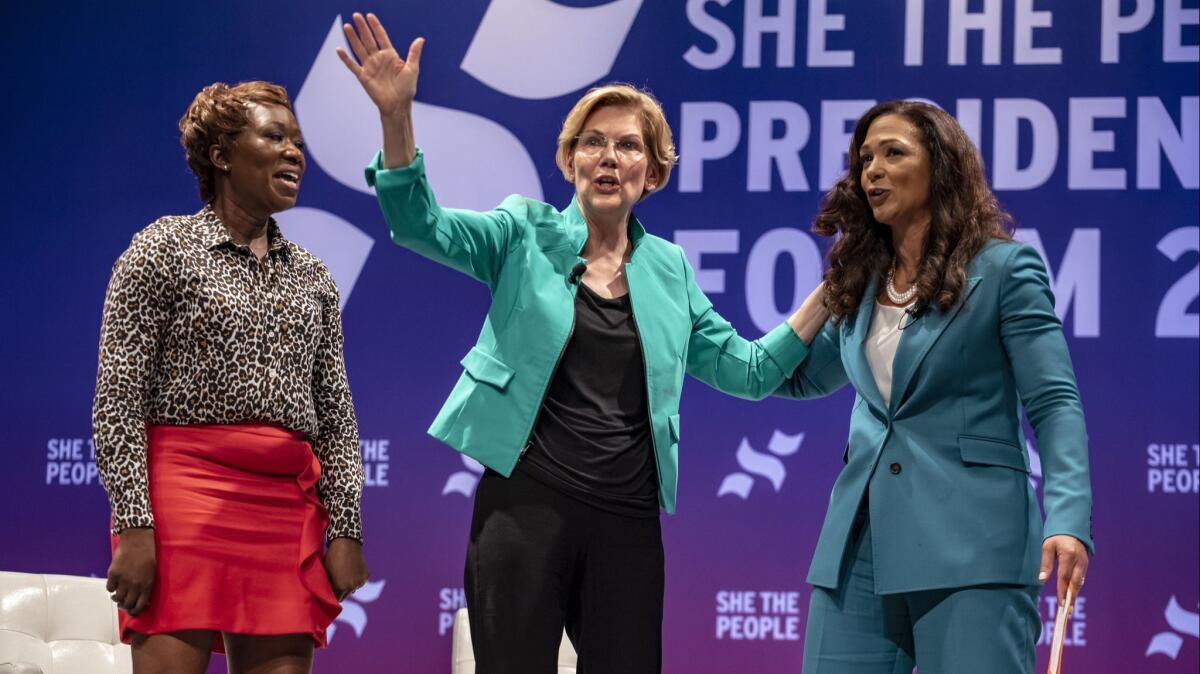2020: Kamala Harris and Elizabeth Warren capturing attention of black women voters

- Share via
Reporting from New Orleans — Regina Banks’ favorite presidential candidate is Kamala Harris, followed closely by Elizabeth Warren.
Except when she prefers Warren, followed closely by Harris.
“It depends on what time of the day you ask me who I’m feeling,” said Banks, 40, a policy analyst who lives outside Sacramento.
In this large Democratic presidential field, it is Harris, a biracial former prosecutor who straddles the party’s moderate and liberal flanks, and Warren, a white ex-professor turned unabashed progressive, who are increasingly capturing the attention of Banks and other black women.
The candidates have taken distinct routes to appeal to this coveted group of voters. Harris, a senator from California, has leveraged past experiences such as being bused to school and joining a black sorority to form bonds with other women of color. Warren, a senator from Massachusetts, has used her raft of policy plans to portray herself as a can-do problem solver to address issues that deeply resonate with black voters, such as universal childcare or student-debt relief.
“By and large, pocketbook issues — the economy, jobs, wages — are motivating [black] voters,” said pollster Ron Lester, who has done extensive research into the African American electorate and presidential campaigns.
Women of color pose a question for Democratic candidates: Why should we vote for you? »
Even as the two contenders have made substantial inroads with African American women, they have distinct hurdles to clear, said LaTosha Brown, co-founder of Black Voters Matter.
Harris, she said, must better introduce herself to African Americans and ensure they “really understand her role as a prosecutor,” which may give pause to some people skeptical of the criminal justice system.
Warren “has to convince people that she’s able to beat Trump,” Brown said.
And although the two are well-regarded by black women, many of those voters say that before they commit, they want politicians to show they recognize the importance of their support.
“We’re really taking our time, listening carefully,” said Aimee Allison, a San Francisco Bay Area political consultant. “We’re not falling for the okeydoke of getting behind a candidate early and trading away the influence we have.”
Polls have shown several candidates in position to capture the black vote. Former Vice President Joe Biden has demonstrated strength with African Americans, although recent surveys pointed to some drop in support after his strained exchange with Harris in the first Democratic debate. Harris has reaped the greatest benefit from Biden’s decline, while Warren’s backing among nonwhites has hovered in the single digits. Sen. Bernie Sanders of Vermont also has registered notable black support in certain polls.
Harris’ stock has risen overall in the weeks after the June debate, where in compelling personal terms she took Biden to task for his past opposition to busing as a means to desegregate schools. For some voters, the performance held an added layer of relatability.
“As a black woman, there are so many times when you’re at the table and you’re the only one,” said Lakia Jackson, 35, who watched the debate at a barber school in Goose Creek, S.C.
The thought of a woman of color being a viable presidential contender, Jackson said, “is so overwhelming that I’m tearful. It’s so inspirational to see someone seizing the opportunity. She’s authentically Kamala. She’s authentically a black woman.”
Ten days later at the Essence Festival, Harris was greeted warmly at the annual music and cultural celebration of black women that attracted more than half a million over the Fourth of July weekend in New Orleans. Before an audience of thousands, Harris, the daughter of a Jamaican father and Indian mother, framed her presidential run as heir to the legacy of other barrier-breaking black women, such as Sojourner Truth and Rosa Parks.
“The fight of black women has always been fueled and grounded in faith and in the belief in what is possible,” Harris said. “We have always built the future that we can see and believe in and fight for.”
Among those listening intently was Ashley Smalls, who shares with Harris an alma mater — Howard University — and a sisterhood in the Alpha Kappa Alpha sorority. And Harris’ campaign platform — namely, her plan to boost teacher pay — caused Smalls, a science teacher, to whoop in agreement.
“I’ve always followed her. I know about her achievements as attorney general in California — the work she’s done,” said Smalls, beaming as Harris wrapped her speech.
But when it comes to Smalls’ loyalties, Harris has competition.
“I love Elizabeth Warren,” said Smalls, 31, of Raleigh, N.C. “I just love her spirit and her determination.”

Although many black women say they find Harris’ candidacy inspiring, they’re quick to point out that their allegiance is not tied to shared identity.
“We get boxed and framed as if race is the determinant,” said Brown of Black Voters Matter. “Race is only one determinant for us. We have demonstrated with the election of [Alabama Sen.] Doug Jones and others that we will get behind a white candidate.”
Warren proved she could gain traction with black voters at an April conference of female political activists of color. She was a runaway favorite among multiple candidates, including Harris, and won high marks for her fluency in talking about racial discrimination in healthcare and housing.
Allison, the political consultant who organized the conference, said Warren won the room when she described her audience as women who had never been given anything and who had had to fight for all their gains — a pugnacity the candidate said she shared.
“That’s a kind of bridge-building language: I see you, I feel you, I’m with you,” Allison said.
Although Harris has ties to significant black organizing forces such as the AKA sorority, activists say Warren also may be making inroads on the grass-roots level, through methodical, behind-the-scenes overtures.
Elika Bernard, a Sacramento community organizer, was one of a dozen black women invited to meet with Warren in May after an Oakland rally. The photo op left a lasting impression.
“Even her staff wanted in on that photo. It was like a sister moment with Elizabeth Warren,” said Bernard, 31.
As the flash went off, the crowd shouted in unison “black women!” and the presidential candidate was the loudest of them all, Bernard said.
“It was so genuine,” she said. “She has a heart for black women.”
Kamala Harris and Cory Booker embrace new era for black candidates post-Obama »
Warren’s brand — “I’ve got a plan” — is particularly appealing to black women who say they are weary of vague promises from politicians and are craving specific solutions.
“She anticipates some of the challenges that African Americans face,” pollster Lester said, such as lack of access to child care.
Both candidates have jostled to demonstrate they’re most plugged into the concerns of black women. Harris in 2018 first introduced a bill addressing high maternal mortality among women of color, and Warren released her own plan this spring. Last fall, the Massachusetts senator proposed housing assistance to communities that historically suffered under the discriminatory housing policy known as redlining. Harris rolled out a similar plan in New Orleans on July 6.
Five other candidates joined Harris and Warren at the Essence Festival, where women said they were intrigued by New Jersey Sen. Cory Booker’s residency in predominantly black Newark or by South Bend, Ind., Mayor Pete Buttigieg’s buzzy climb. Biden, who did not attend the event, had support from older women who liked his governing experience and his perceived strength against Trump.
But for now, it’s Harris and Warren who are getting the most mention.
“While they are so different, they are so much the same in how they’re trying to speak to the generational issues that African American women face,” said Antjuan Seawright, a South Carolina-based Democratic strategist. “That’s why you’ve seen their collective rise in the polls.”
Neither woman can claim that voting bloc as her own yet, he cautioned.
“At this point,” Seawright said, “I don’t think one is passing the other on the political highway.”
More to Read
Get the L.A. Times Politics newsletter
Deeply reported insights into legislation, politics and policy from Sacramento, Washington and beyond. In your inbox three times per week.
You may occasionally receive promotional content from the Los Angeles Times.











